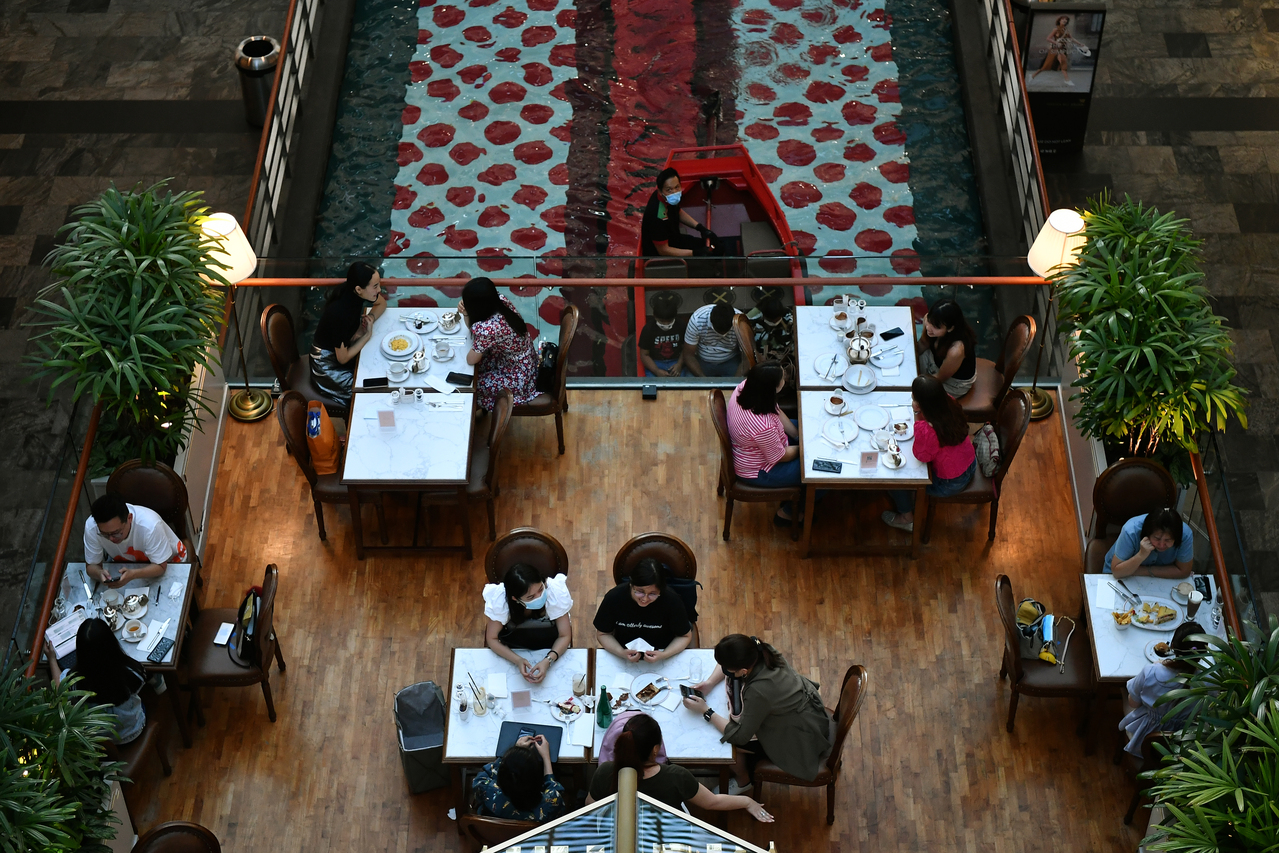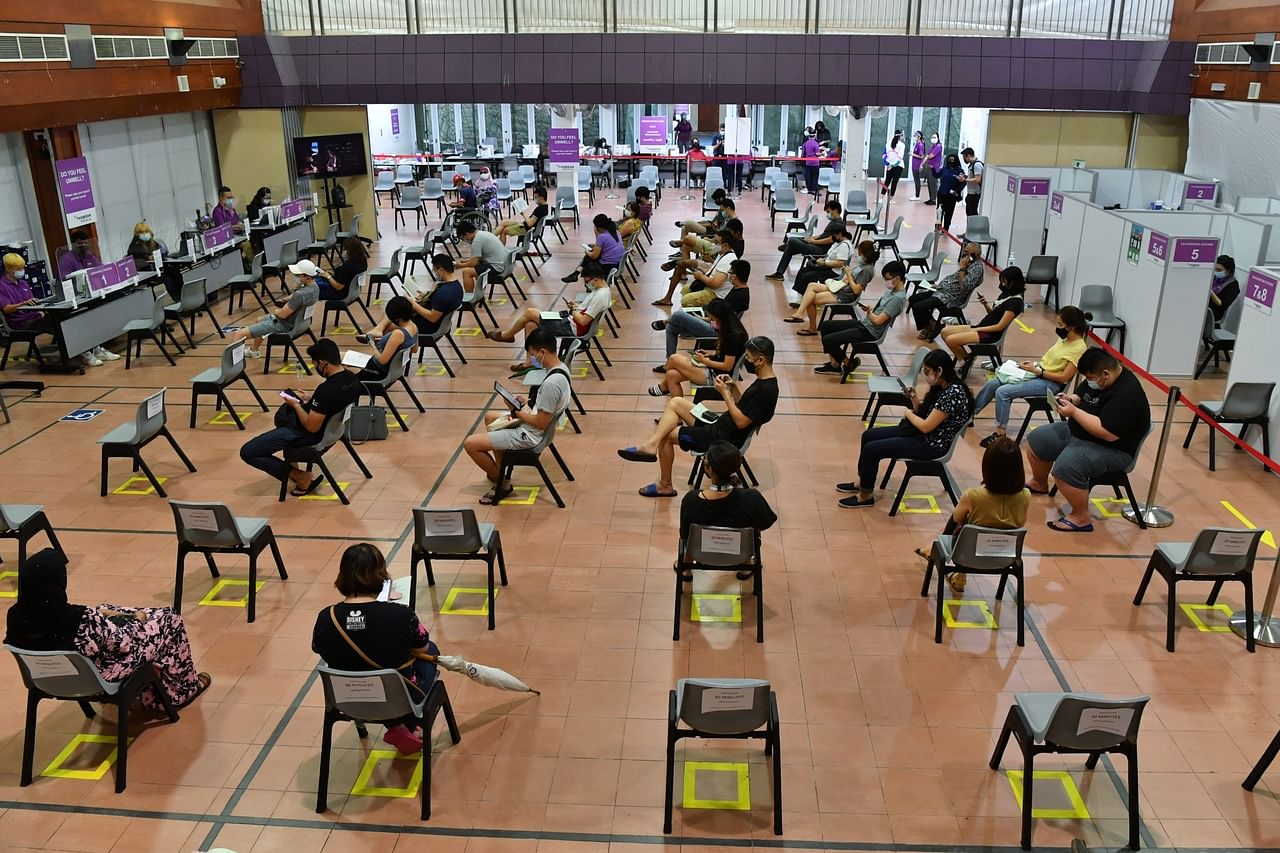Commentary
Only fair to protect vulnerable in S'pore against Covid-19 spread by unvaccinated people
Sign up now: Get ST's newsletters delivered to your inbox

Singapore is easing up on Covid-19 measures, including allowing fully vaccinated people to dine at eateries in groups of up to five.
PHOTO: ST FILE
SINGAPORE - People who have not been vaccinated will be getting the short end of the stick as Singapore eases up on Covid-19 measures.
Those who have been fully vaccinated, and that is two-thirds of the population currently, will be able to gather in groups of up to five people for activities such as dining in and masks-off sports from next Tuesday (Aug 10).
To join them, unless they are children below the age of 12, people who have not been vaccinated, or been previously infected, will need a valid pre-event test result.
People who have been vaccinated will also be able to resume activities and services that require the removal of masks, such as facials and saunas. But the unvaccinated cannot.
And from October, unvaccinated people working in sectors where there is a risk that they could transmit the disease to customers will need to carry out twice-weekly tests to prove they are not infected.
There are three groups of people not vaccinated:
1. Children under the age of 12, for whom there is currently no Covid-19 vaccine. Some exemptions have been made for them, such as eating out with their families.
2. People who are unable to get vaccinated for medical reasons. The number in this group is very small. They need to take extra care not to get infected since their medical conditions could lead to more serious illness.
3. People who are able to but for personal reasons refuse to be vaccinated. This is the group that is the target of the differentiated treatment.
Is the Government being fair to them? After all, Covid-19 vaccination is not compulsory, unlike vaccination against diphtheria and measles.
So, should it not be up to the individual whether to get vaccinated or to risk getting the disease? Why stop them from taking part in activities that others can?
The multi-ministry task force tackling the pandemic said: "Unvaccinated individuals will need to exercise tighter safe management measures to protect themselves and those around them."
So yes, they are being discriminated against, even as the choice of being vaccinated remains with them.
But instead of asking if this is fair to them, we should ask: Are these people being fair to the rest of the nation?
People who are not vaccinated face a much higher risk of getting infected and spreading the disease. This could lead to an upsurge in cases, more clusters and many people falling sick. Unvaccinated seniors who become infected also face higher risks of falling seriously ill.
Society has the right to protect itself against harm.
Should many unvaccinated people get seriously ill, it would be a big drain on the healthcare system. It is not just the cost of their treatment which the country has to bear.
Last year, non-urgent medical treatments were postponed to free up hospital space. If the healthcare system is overwhelmed, patients with other medical problems also suffer.
Another possible consequence of allowing those not vaccinated to mingle freely is that they could spread the disease to at-risk people in the population, who may be vaccinated.
The vaccine does not give 100 per cent protection.
Several people in Singapore who were fully vaccinated have fallen seriously ill. They all have medical conditions that likely made them more susceptible to catching the virus and developing serious symptoms.
These individuals, as well as people who cannot be vaccinated for medical reasons, remain at high risk. They need to be protected, since it is through no fault of theirs that they are put at risk.

Generic photos of people resting in the observation area after getting their covid-19 vaccinations at Potong Pasir Community Club on June 26 2021 MTF said tomorrow onwards they'll increase vax to 80k daily. We'll be speaking to residents on why they chose to wait so long before getting vaccinated, if they know anyone who got Covid-19, etc.
PHOTO: ST
So asking those who refuse to get vaccinated to get tested - to prove they are free from the disease before being allowed to participate - is actually being fair to all.
It is a practice other countries, such as Italy and Pakistan, are also implementing.
People who refuse to vaccinate put themselves at risk. But so long as vaccination is not compulsory, it is their choice to make.
But we should not allow that freedom or choice to put others at risk.
In fact, Singapore should go one step further and not provide subsidised treatment, or insurance coverage, for people who can but refuse to get vaccinated, should they become infected with Covid-19.
After all, their refusal to vaccinate is tantamount to a self-inflicted injury.


